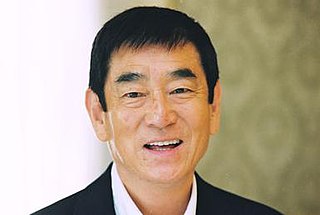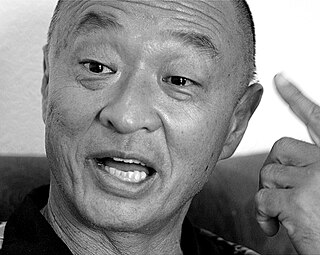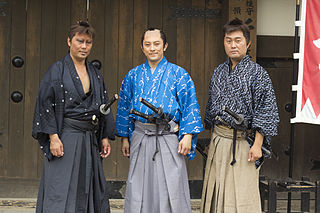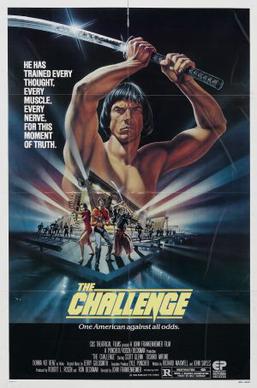This article needs additional citations for verification .(June 2024) |
The following is a list of foreign films set in Japan. Japan has provided an exotic and cosmopolitan backdrop to many international films set mostly or entirely in Japan. A common theme of western films set in Japan is the differences between Japanese and Western culture and how the characters cope with their new surroundings.
#
- 3 Ninjas: Kick Back (1994) — directed by Charles T. Ganganis, starring Victor Wong and Max Elliot Slade
- 47 Ronin (2013) — directed by Carl Rinsch, starring Keanu Reeves and Hiroyuki Sanada
A
- Around the World in Eighty Days (1956) — directed by Michael Anderson, starring David Niven and Cantinflas
- Atout coeur à Tokyo pour OSS 117 (1966) — directed by Michel Boisrond, starring Frederick Stafford and Marina Vlady
B
- Babel (2006) — directed by Alejandro González Iñárritu, starring Brad Pitt, Cate Blanchett and Gael García Bernal
- Back at the Front (1952) — directed by George Sherman, starring Tom Ewell and Harvey Lembeck
- The Bad News Bears Go to Japan (1978) — directed by John Berry, starring Tony Curtis and Jackie Earle Haley
- The Barbarian and the Geisha (1958) — directed by John Huston, starring John Wayne and Eiko Ando
- Batman Ninja (2018) — directed by Junpei Mizusaki, starring Kōichi Yamadera
- Big Hero 6 (2014) — directed by Don Hall and Chris Williams, starring Scott Adsit and Ryan Potter
- Black Rain (1989) — directed by Ridley Scott, starring Michael Douglas and Ken Takakura
- Blood on the Sun (1945) — directed by Frank Lloyd, starring James Cagney and Sylvia Sidney
- Bullet Train (2022) — directed by David Leitch, starring Brad Pitt
- Bushido Blade (1981) — directed by Shusei Kotani, starring Timothy Patrick Murphy and Frank Converse
C
- Café Lumière (2003) – directed by Hou Hsiao-hsien [1]
- Cars 2 (2011) — directed by John Lasseter, starring Owen Wilson
- The Challenge (1982) — directed by John Frankenheimer, starring Scott Glenn and Toshirō Mifune
- Cold Fever (1995) — directed by Friðrik Þór Friðriksson, starring Masatoshi Nagase and Lili Taylor
D
E
- Earthquake Bird (2019) — directed by Wash Westmoreland, starring Alicia Vikander and Riley Keough
- Emperor (2012) — directed by Peter Webber, starring Matthew Fox and Tommy Lee Jones
- Enlightenment Guaranteed (2000) — directed by Doris Dörrie, starring Uwe Ochsenknecht and Gustav-Peter Wöhler
- Enter the Void (2009) — directed by Gaspar Noé, starring Nathaniel Brown and Paz de la Huerta
- Escapade in Japan (1957) — directed by Arthur Lubin, starring Cameron Mitchell and Jon Provost
F
- Fast & Furious 6 (2013) — directed by Justin Lin, starring Vin Diesel and Paul Walker
- The Fast and the Furious: Tokyo Drift (2006) — directed by Justin Lin, starring Lucas Black and Bow Wow
- Fear and Trembling (2003) — directed by Alain Corneau, starring Sylvie Testud and Kaori Tsuji
- Flags of Our Fathers (2006) — directed by Clint Eastwood, starring Ryan Phillippe and Jesse Bradford
G
- Godzilla (2014) — directed by Gareth Edwards, starring Aaron Taylor-Johnson and Ken Watanabe
- The Grudge (2004) — directed by Takashi Shimizu, starring Sarah Michelle Gellar and Jason Behr
- Gung Ho (1986) — directed by Ron Howard, starring Michael Keaton
H
- Hacksaw Ridge (2016) — directed by Mel Gibson, starring Andrew Garfield and Sam Worthington
- The Handmaiden (2016) — directed by Park Chan-wook, starring Kim Min-hee and Kim Tae-ri
- House of Bamboo (1955) — directed by Samuel Fuller, starring Robert Ryan and Robert Stack
- The Hunted (1995) — directed by J.F. Lawton, starring Christopher Lambert
I
- Into the Sun (2005) — directed by Christopher Morrison, starring Steven Seagal and Matt Davis
- Isle of Dogs (2018) — directed by Wes Anderson, starring Bryan Cranston and Edward Norton
J
- Jack London (1943) — directed by Alfred Santell, starring Michael O'Shea
- Japanil Kalyanaraman (1985) — directed by S.P. Muthuraman, starring Kamal Haasan and Radha
- John Wick: Chapter 4 (2023) — directed by Chad Stahelski, starring Keanu Reeves and Donnie Yen
K
- The Karate Kid 2 (1986) — directed by John Avildsen, starring Ralph Macchio and Pat Morita
- Kill Bill vol. 1 (2003) — directed by Quentin Tarantino, starring Uma Thurman and Lucy Liu [1]
- Kate (2021) — directed by Cedric Nicolas-Troyan, starring Mary Elizabeth Winstead and Woody Harrelson
L
- The Last Samurai (2003) — directed by Edward Zwick, starring Tom Cruise and Ken Watanabe
- Letters from Iwo Jima (2006) — directed by Clint Eastwood, starring Ken Watanabe and Kazunari Ninomiya
- Lost in Translation (2003) — directed by Sofia Coppola, starring Bill Murray and Scarlett Johansson [1]
M
- Mastermind (1976) — directed by Alex March, starring Zero Mostel and Keiko Kishi
- The Matrix Resurrections (2021) — directed by Lana Wachowski, starring Keanu Reeves and Carrie-Anne Moss
- Memoirs of a Geisha (2005) — directed by Rob Marshall, starring Zhang Ziyi and Gong Li
- Minamata (2020) — directed by Andrew Levitas, starring Johnny Depp and Hiroyuki Sanada
- Mishima: A Life in Four Chapters (1985) — directed by Paul Schrader, starring Ken Ogata and Masayuki Shionoya
- Mr. Baseball (1992) — directed by Fred Schepisi, starring Tom Selleck and Ken Takakura
- Mr. Holmes (2015) — directed by Bill Condon, starring Ian McKellen and Laura Linney
- Monster (2008) — directed by Eric Forsberg, starring Sarah Lieving and Erin Evans
- Mortal Kombat (2021) — directed by Simon McQuoid, starring Lewis Tan and Jessica McNamee
- My Geisha (1962) — directed by Jack Cardiff, starring Shirley MacLaine and Yves Montand
N
- Navy Wife (1956) — directed by Edward Bernds
- Nobody's Perfect — directed by Alan Rafkin
O
- Okinawa Rendez-vous — directed by Gordon Chan
- Oriental Evil — directed by George P. Breakston
P
- The Pacific (2010), miniseries — starring James Badge Dale and Jon Seda
- Pearl Harbor (2001) — directed by Michael Bay, starring Ben Affleck and Josh Hartnett
- People Just Do Nothing: Big in Japan (2021) — directed by Jack Clough, starring Alan Mustafa and Hugo Chegwin
Q
R
- The Ramen Girl (2009) — directed by Robert Allan Ackerman, starring Brittany Murphy and Sohee Park
- Resident Evil: Afterlife (2010) — directed by Paul W. S. Anderson, starring Milla Jovovich
- Rush (2013) — directed by Ron Howard, starring Chris Hemsworth and Daniel Brühl
S
- Sands of Iwo Jima (1949) — directed by Allan Dwan, starring John Wayne and John Agar
- Sayonara (1957) — directed by Joshua Logan, starring Marlon Brando and Miiko Taka
- Scooby-Doo! and the Samurai Sword — directed by Christopher Berkeley
- The Sea of Trees (2015) — directed by Gus Van Sant, starring Matthew McConaughey and Ken Watanabe
- The Sea Wolf (1930) — directed by Alfred Santell, starring Milton Sills
- The Secret Game (1917) — directed by William C. de Mille, starring Sessue Hayakawa
- Shōgun (1980), miniseries — directed by Jerry London, starring Richard Chamberlain and Toshirō Mifune
- Snake Eyes: G.I. Joe Origins (2021) — directed by Robert Schwentke, starring Henry Golding and Andrew Koji
- Stopover Tokyo (1957) — directed by Richard L. Breen, starring Robert Wagner and Joan Collins
- Stratosphere Girl (2004) — directed by Matthias X. Oberg, starring Chloé Winkel
T
- The Teahouse of the August Moon (1956) — directed by Daniel Mann, starring Marlon Brando and Glenn Ford
- Teen Titans: Trouble in Tokyo (2006)
- Tokyo! (2008) — directed by Michel Gondry, Leos Carax and Bong Joon-ho
- Tokyo Eyes (1998) — directed by Jean-Pierre Limosin, starring Shinji Takeda and Hinano Yoshikawa
- Tokyo Fiancée (2014) — Belgian film written and directed by Stefan Liberski
- Tokyo Joe (1949) — directed by Stuart Heisler, starring Humphrey Bogart and Alexander Knox
- Tokyo Pop (1988) — directed by Fran Rubel Kuzui, starring Carrie Hamilton and Diamond Yukai
- Tora! Tora! Tora! (1970) — directed by Richard Fleischer and Kinji Fukasaku, starring Martin Balsam and Soh Yamamura
- Typhon sur Nagasaki (1957) — directed by Yves Ciampi, starring Jean Marais and Danielle Darrieux
U
- Unbroken (2014) — directed by Angelina Jolie, starring Jack O'Connell and Domhnall Gleeson
V
W
- Walk Don't Run (1966) — directed by Charles Walters, starring Cary Grant, Samantha Eggar, Jim Hutton
- Wasabi (2001) — directed by Gérard Krawczyk, starring Jean Reno and Ryōko Hirosue
- The Wolverine (2013) — directed by James Mangold, starring Hugh Jackman and Hiroyuki Sanada
X
Y
- The Yakuza (1975) — directed by Sydney Pollack, starring Robert Mitchum and Ken Takakura
- Yoshiwara — directed by Max Ophüls
- You Only Live Twice (1967) — directed by Lewis Gilbert, starring Sean Connery and Akiko Wakabayashi
Z














